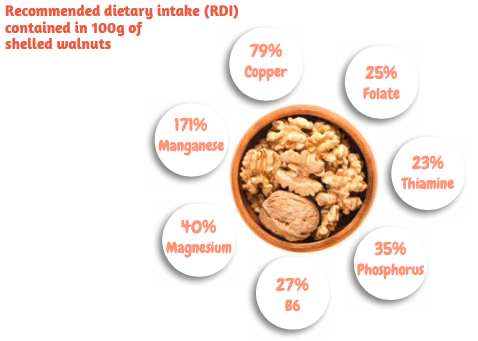|
19/5/2021 0 Comments Walnuts – health in a nutshellWalnuts are wrinkled, brain-shaped brown nuts – actually, a botanist might tell you they’re technically seeds – which grow on trees and come in hard shells. They’re versatile, tasty, can be eaten raw or toasted, and are widely used in both sweet and savoury recipes.WHAT’S IN A WALNUT?
Like other nuts, most of the kilojoules in walnuts come from fat, but these are considered ‘good’ fats – high in omega fatty acids and polyunsaturated fats. They contain little saturated fat and no cholesterol. This fat profile helps to increase HDL (‘good’) cholesterol and lower LDL (‘bad’) cholesterol. Don’t be deceived by their unassuming appearance; they’re also incredibly dense in many essential minerals and vitamins, and have strong antioxidant and anti- inflammatory properties which can help reduce risk and improve symptoms for a range of chronic and acute conditions. Walnuts are around 15% protein and high in dietary fibre. In short, they’re very good for you. LATEST RESEARCH ON HEALTH BENEFITS OF WALNUTS Heart disease, stroke and cancer consistently give us the highest global death rate of any diseases. This also means that these diseases are at the forefront of research into prevention and treatment. Recent research into the potential health benefits of walnuts had exciting results. Researchers expected that walnuts would help to reduce people’s cholesterol levels, directly reducing their risk of cardiovascular disease. In fact, the people who consumed higher amounts of walnuts were found to have dramatically reduced inflammatory markers in the blood, indicating that walnuts can help to reduce chronic inflammation. This could have beneficial implications for the wide range of conditions associated with chronic inflammation, such as cancer, heart disease, type 2 diabetes, arthritis and more. We know that many diseases are often preventable and that there are simple – though not always easy – steps to take to reduce our risk through a healthy lifestyle. The nutrient profile and research on walnuts suggest that they are one of the healthiest foods to add to a balanced diet. In addition, they’re readily available and relatively inexpensive in most places around the world. There’s no reason not to eat more walnuts!
0 Comments
Leave a Reply. |
AuthorAdam's Back is a team of dedicated complimentary health professionals. Our aim is to support you in finding drug-free solutions for better health. Archives
July 2024
Categories |
Search by typing & pressing enter


 RSS Feed
RSS Feed